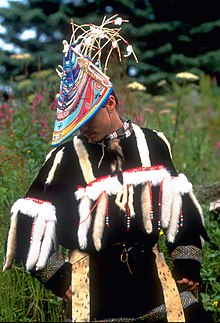 A Sugpiaq dancer | |
| Total population | |
|---|---|
| 4,000-12,000 | |
| Regions with significant populations | |
| United States (Alaska) | >4,000 |
| Languages | |
| Sugcestun, English | |
| Religion | |
| Orthodox Church in America, traditional religion | |
| Related ethnic groups | |
| Yup'ik, Aleut | |

The Alutiiq people (pronounced /əˈluːtɪk/ ə-LOO-tik in English; from Promyshlenniki Russian Алеутъ, "Aleut";[1][2][3] plural often "Alutiit"), also called by their ancestral name Sugpiaq (/ˈsʊɡˌbjɑːk/ SUUG-byahk or /ˈsʊɡpiˌæk/ SUUG-pee-AK; plural often "Sugpiat"), as well as Pacific Eskimo or Pacific Yupik, are one of eight groups of Alaska Natives that inhabit the southern-central coast of the region.[4]
Their traditional homelands date back to over 7,500 years ago, and include areas such as Prince William Sound and outer Kenai Peninsula (Chugach Sugpiaq), the Kodiak Archipelago and the Alaska Peninsula (Koniag Alutiiq). In the early 1800s there were more than 60 Alutiiq villages in the Kodiak archipelago, with an estimated population of 13,000 people. Today more than 4,000 Alutiiq people live in Alaska.[5]
- ^ "Report on Population and Resources of Alaska at the Eleventh Census: 1890". United States Census Office - Alaska - 1893. (= "The Kaniagmiut, to whom the Russians applied the name of Aleut")
- ^ "East Prince William Sound Landscape Assessment" (PDF). Cordova Ranger District, Chugach National Forest. September 9, 2008. (= "The term Alutiiq is the Sugtestun pronunciation of the Russian-introduced name Aleut and is commonly used as a self-designation by the people of the Chugach region"; Russian: Алутиик)
- ^ "Mapping Alaska's Native languages". Archived from the original on 2015-01-06. (= Names derived from a combination of Russian and Native words include: Alutiiq, from the Russian word Aleut (a term something like English "Eskimo" but referring to the people of the Aleutian Islands, the Alaska Peninsula, and the Kodiak archipelago); plus the Russian plural suffix -y; plus the Native singular suffix -q)
- ^ "Alutiiq / Sugpiaq People". alutiiqmuseum.org. Retrieved 2023-05-07.
- ^ ""Alutiiq / Suqpiaq Nation"" (PDF). Alutiiq Museum.